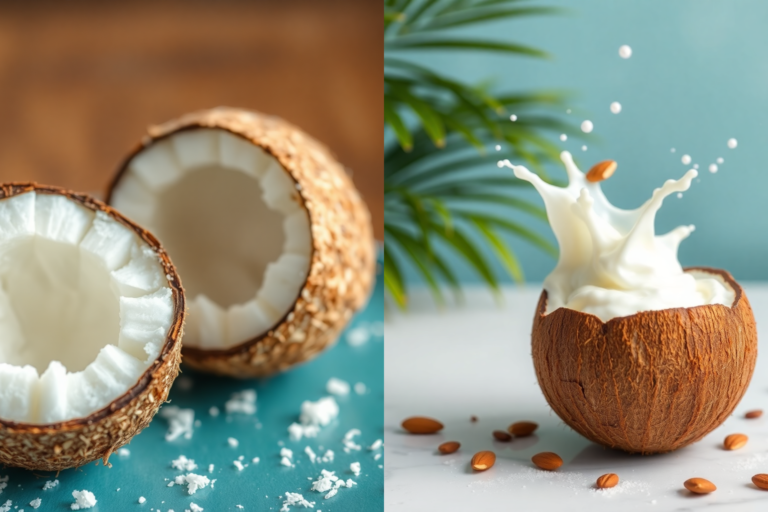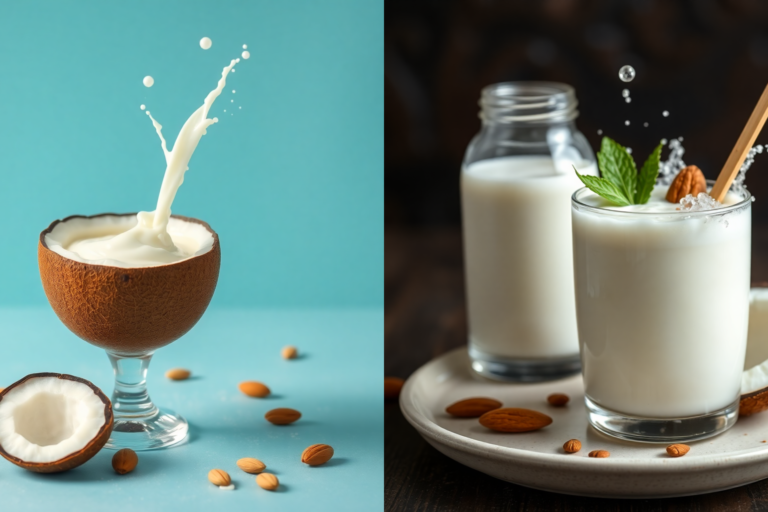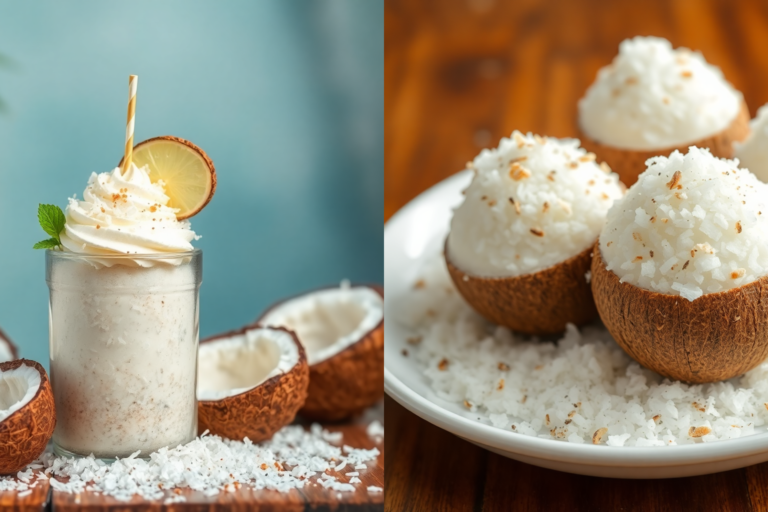Introduction: Understanding Desiccated Coconut and Its Nutritional Importance
Brief Overview of Desiccated Coconut
Desiccated Coconut is a versatile and nutrient-rich ingredient made from fresh coconut meat that has been finely grated and dried to remove most of its moisture content. This process not only extends its shelf life but also intensifies the flavor, making Desiccated Coconut a popular choice in a variety of culinary applications. Whether you’re baking coconut-flavored cakes, preparing energy bars, or adding texture to savory dishes, Desiccated Coconut provides a delightful tropical essence that elevates both sweet and savory recipes.
Desiccated Coconut is commonly used in baking, where it adds texture and flavor to cookies, cakes, and pastries. It’s also a staple in many global cuisines, often incorporated into curries, salads, and even beverages. The fine texture and rich taste of Desiccated Coconut make it an ideal ingredient for enhancing the flavor and nutritional profile of a wide range of dishes.
Importance of Exploring the Nutritional Benefits of Desiccated Coconut
Understanding the nutritional benefits of Desiccated Coconut is crucial for anyone looking to make healthier dietary choices. While it’s known for its delicious taste and versatility, Desiccated Coconut is also packed with essential nutrients that can contribute to overall health and well-being. From providing a rich source of dietary fiber that supports digestive health to being high in healthy fats that are beneficial for heart health, Desiccated Coconut offers a variety of nutritional advantages that make it a valuable addition to any diet.
Incorporating Desiccated Coconut into your daily meals can not only enhance the flavor of your dishes but also provide significant health benefits. For those interested in natural, wholesome ingredients, understanding the nutritional profile of Desiccated Coconut can help in making informed dietary choices that support long-term health. The health uses of Desiccated Coconut extend beyond its nutritional value; it’s also known for its benefits in skincare, weight management, and more, making it an ingredient worth exploring in both your kitchen and daily routines.
What is Desiccated Coconut?
Definition of Desiccated Coconut
Desiccated coconut is a finely grated, dried, and unsweetened form of coconut that is commonly used in cooking and baking. Unlike shredded or flaked coconut, which may have larger, more textured pieces, desiccated coconut is more refined, offering a fine and powdery consistency. The process of making desiccated coconut involves removing the brown outer shell of the coconut and grating the white coconut flesh into small pieces. These pieces are then thoroughly dried, typically using hot air, until they contain very little moisture—usually around 3% or less. This drying process not only extends the shelf life of desiccated coconut but also preserves its flavor and nutritional properties.
Desiccated coconut is different from other forms like shredded or flaked coconut in both texture and moisture content. Shredded coconut consists of longer, coarser strands, while flaked coconut is usually larger, thin, flat pieces. Both shredded and flaked coconut retain more moisture compared to desiccated coconut, making desiccated coconut the preferred choice for recipes that require a finer texture and longer shelf life. Because of its dryness, desiccated coconut is also more versatile and can be used in a variety of culinary applications, from sprinkling over baked goods to incorporating into smoothies for added texture and flavor.
Nutritional Profile of Desiccated Coconut
Desiccated coconut is not just a flavorful addition to your recipes but also a nutritious one. It is packed with essential nutrients that make it a valuable ingredient in a healthy diet. A 100-gram serving of desiccated coconut typically contains around 660 calories, making it a high-energy food. This serving size also provides approximately 65 grams of fat, with a significant portion being healthy saturated fats known as medium-chain triglycerides (MCTs). These MCTs are easily metabolized by the body, providing a quick source of energy and supporting various bodily functions.
In addition to fats, desiccated coconut is a good source of dietary fiber, containing about 14 grams per 100 grams. This high fiber content promotes digestive health, aids in maintaining regular bowel movements, and helps in managing weight by keeping you feeling full for longer periods. Desiccated coconut also offers a moderate amount of carbohydrates, around 24 grams per 100 grams, which includes natural sugars that provide a subtle sweetness without the need for added sugars.
Desiccated coconut is also rich in essential minerals. It contains significant amounts of manganese, copper, and iron, which are vital for bone health, red blood cell formation, and overall metabolic functions. Additionally, desiccated coconut provides small amounts of protein, contributing to muscle repair and growth, although it should be paired with other protein sources for a balanced diet.
In summary, desiccated coconut is a nutrient-dense food that offers a high-energy, fiber-rich, and mineral-packed option for those looking to enhance their diet. Whether used in cooking, baking, or as a topping, desiccated coconut provides both flavor and nutrition, making it an excellent addition to a variety of dishes.
Top 5 Nutritional Benefits of Desiccated Coconut
1. Rich Source of Healthy Fats
Desiccated coconut is a rich source of healthy fats, particularly medium-chain triglycerides (MCTs). Unlike long-chain fatty acids, MCTs are easily absorbed and metabolized by the liver, providing a quick and efficient energy source. These fats not only fuel your body but also enhance metabolism, making desiccated coconut an ideal ingredient for those seeking sustained energy throughout the day. The presence of MCTs in desiccated coconut has also been linked to improved weight management and cardiovascular health, making it a valuable addition to your diet.
2. High in Dietary Fiber
One of the standout nutritional benefits of desiccated coconut is its high dietary fiber content. Fiber plays a crucial role in promoting digestive health by aiding in regular bowel movements and preventing constipation. Consuming foods rich in fiber, such as desiccated coconut, can also help you feel fuller for longer, which is beneficial for weight management. The fiber in desiccated coconut supports the healthy functioning of the digestive system, reduces the risk of digestive disorders, and helps maintain stable blood sugar levels.
3. Contains Essential Minerals
Desiccated coconut is packed with essential minerals that support various bodily functions. It is particularly rich in manganese, copper, and selenium. Manganese is vital for bone health and metabolism, copper aids in the formation of red blood cells, and selenium is a powerful antioxidant that protects cells from damage. These minerals make desiccated coconut a nutrient-dense food that contributes to overall health and well-being. Including desiccated coconut in your diet ensures that you receive these important nutrients, supporting everything from bone strength to immune function.
4. Low in Carbohydrates
For those following low-carb or ketogenic diets, desiccated coconut is an excellent choice. It is naturally low in carbohydrates, making it suitable for individuals looking to reduce their carb intake without compromising on flavor or nutrition. The low-carb nature of desiccated coconut allows it to fit seamlessly into various dietary plans, helping to maintain ketosis in ketogenic diets or simply reducing overall carbohydrate consumption. By incorporating desiccated coconut into your meals, you can enjoy its rich taste and nutritional benefits while adhering to your dietary goals.
5. Source of Protein
Desiccated coconut is also a source of protein, an essential nutrient that plays a key role in muscle repair, immune function, and overall health. Although not as high in protein as other sources like meat or legumes, desiccated coconut provides a plant-based option that can complement your protein intake. The protein in desiccated coconut contributes to the maintenance and repair of body tissues, making it a useful addition to a balanced diet. Whether you’re looking to support muscle recovery or simply boost your protein intake, desiccated coconut offers a nutritious option.
Health Uses of Desiccated Coconut
1. Supporting Weight Loss
How It Helps:
Desiccated Coconut is a powerful ally in weight management due to its high content of dietary fiber and healthy fats. The fiber in desiccated coconut promotes a feeling of fullness, reducing the likelihood of overeating and helping control cravings. When consumed as part of a balanced diet, the medium-chain triglycerides (MCTs) found in desiccated coconut are metabolized quickly, providing energy and reducing the storage of excess fat. This combination of fiber and MCTs makes desiccated coconut an effective ingredient for those looking to maintain or reduce their weight naturally.
2. Boosting Heart Health
How It Helps:
Desiccated Coconut is rich in healthy fats, particularly MCTs, which have been shown to improve cholesterol levels and support cardiovascular health. Unlike long-chain fatty acids, MCTs are more readily used by the body for energy rather than being stored as fat. This can lead to improved levels of HDL (good) cholesterol while lowering LDL (bad) cholesterol. Incorporating desiccated coconut into your diet may help reduce the risk of heart disease by promoting a healthier lipid profile and enhancing overall heart health.
3. Enhancing Digestive Health
How It Helps:
The high fiber content in desiccated coconut plays a crucial role in promoting digestive health. Fiber adds bulk to the stool, aiding in regular bowel movements and preventing constipation. By including desiccated coconut in your meals, you can support a healthy digestive system and reduce the risk of common digestive issues like irritable bowel syndrome (IBS) and bloating. The natural fibers in desiccated coconut also serve as prebiotics, nourishing the beneficial bacteria in your gut and contributing to a balanced microbiome.
4. Managing Blood Sugar Levels
How It Helps:
Desiccated Coconut is an excellent choice for those managing diabetes or looking to maintain stable blood sugar levels. With its low carbohydrate content and high fiber, desiccated coconut helps slow the absorption of sugar into the bloodstream, preventing spikes in blood sugar levels. The MCTs in desiccated coconut also provide a steady source of energy without causing a rapid increase in glucose, making it a valuable addition to the diet of individuals with insulin resistance or type 2 diabetes.
5. Promoting Healthy Skin and Hair
How It Helps:
Desiccated Coconut is not only beneficial when consumed but also when applied topically. The natural oils in desiccated coconut are deeply moisturizing, making it an ideal ingredient in DIY skincare and haircare routines. When used in face masks or body scrubs, desiccated coconut can help to hydrate and nourish the skin, leaving it soft and glowing. For hair, desiccated coconut can be mixed into masks or conditioners to strengthen hair strands, reduce breakage, and promote a healthy scalp. Its antioxidant properties also protect the skin and hair from environmental damage, making desiccated coconut a versatile beauty ingredient.
How to Incorporate Desiccated Coconut into Your Diet
Meta Title: How to Incorporate Desiccated Coconut into Your Diet: Practical Tips and Portion Control
Introduction Desiccated coconut is a versatile ingredient that can elevate the flavor and nutritional profile of various dishes. Whether you’re looking to add a tropical twist to your meals or boost your intake of healthy fats and fiber, desiccated coconut is an excellent choice. In this section, we’ll explore how to incorporate desiccated coconut into your everyday diet through practical recipes and discuss the importance of portion control to maximize its benefits without overconsumption.
Everyday Recipes with Desiccated Coconut
Breakfast Ideas Start your day with a nutritious boost by adding desiccated coconut to your breakfast. Sprinkle it over your morning oatmeal or yogurt for added texture and flavor. You can also mix desiccated coconut into pancake or waffle batter to create a tropical-themed breakfast. For those who enjoy smoothies, adding a tablespoon of desiccated coconut can enhance the richness and nutritional content, providing sustained energy throughout the day.
Snacks and Quick Bites Desiccated coconut is perfect for snacking. You can create energy balls by mixing desiccated coconut with dates, nuts, and a bit of honey. These no-bake snacks are easy to prepare and are a great source of energy. Another idea is to make coconut granola by tossing desiccated coconut with oats, seeds, and a touch of maple syrup before baking. This homemade granola can be enjoyed as a snack on its own or as a topping for yogurt.
Baking and Desserts Incorporate desiccated coconut into your baking to add a delightful texture and flavor to your desserts. Use it as a topping for cakes, muffins, or cupcakes, or mix it directly into the batter. Desiccated coconut is also a key ingredient in many traditional desserts like coconut macaroons, where its unique texture is showcased. For a healthier dessert option, you can make coconut bliss balls by blending desiccated coconut with dates, cocoa powder, and a pinch of sea salt.
Savory Dishes While desiccated coconut is often associated with sweet dishes, it can also be used in savory recipes. Add desiccated coconut to curry dishes for an extra layer of flavor and creaminess. It works particularly well in Thai and Indian cuisines, where it complements the spices and other ingredients. You can also use desiccated coconut as a coating for chicken or fish before baking or frying, creating a crispy, flavorful crust.
Portion Control and Moderation with Desiccated Coconut
Understanding the Nutritional Content While desiccated coconut is rich in healthy fats, fiber, and essential minerals, it is also calorie-dense. To enjoy its benefits without overconsumption, it’s important to be mindful of portion sizes. A tablespoon of desiccated coconut typically contains around 50-60 calories and 5 grams of fat, primarily in the form of medium-chain triglycerides (MCTs), which are beneficial for energy and metabolism.
Tips for Portion Control Incorporating desiccated coconut into your diet doesn’t mean you have to overindulge. Here are some tips for portion control:
- Measure Your Portions: Instead of adding desiccated coconut by sight, use a measuring spoon to control the amount. A tablespoon or two is usually enough to add flavor and nutrition to your meals without excessive calorie intake.
- Balance with Other Ingredients: Combine desiccated coconut with other nutrient-dense ingredients, such as fruits, nuts, and whole grains, to create balanced meals and snacks. This approach ensures you’re getting a variety of nutrients without overloading on fats and calories.
- Use as a Garnish: Instead of using large amounts of desiccated coconut, try using it as a garnish. A small sprinkle on top of dishes can add texture and flavor without significantly increasing the calorie content.
Moderation is Key While desiccated coconut offers numerous health benefits, moderation is essential to avoid potential drawbacks like weight gain from excessive calorie intake. By being mindful of portion sizes and balancing it with other nutritious foods, you can enjoy the benefits of desiccated coconut as part of a healthy, varied diet.
Conclusion: The Power of Desiccated Coconut
Recap of Benefits
Desiccated Coconut is a nutrient-dense food that offers a wide array of health benefits, making it a valuable addition to any diet. One of the primary advantages of Desiccated Coconut is its high dietary fiber content, which promotes digestive health by aiding in regular bowel movements and preventing constipation. Additionally, the healthy fats present in Desiccated Coconut, particularly the medium-chain triglycerides (MCTs), are known to support heart health by improving cholesterol levels and providing a steady source of energy.
Moreover, Desiccated Coconut is packed with essential minerals such as iron, manganese, and copper, all of which are crucial for maintaining strong bones and overall physical well-being. The natural antioxidants in Desiccated Coconut play a significant role in reducing inflammation and protecting cells from oxidative stress, further enhancing its health benefits.
In terms of health uses, Desiccated Coconut can be a powerful ally in weight management by helping to control hunger and provide a sense of fullness. Its application extends beyond nutrition, as Desiccated Coconut can also improve skin health when used in skincare routines, support cognitive function thanks to its MCT content, boost the immune system with its rich antioxidant profile, and promote healthy hair when included in hair care products.
Encouragement to Include Desiccated Coconut in Your Diet
Given the numerous benefits of Desiccated Coconut, it’s clear that incorporating this versatile ingredient into your daily diet can contribute to a healthier lifestyle. Whether you sprinkle it on your morning yogurt, blend it into smoothies, or use it as an ingredient in baked goods, Desiccated Coconut is an easy and delicious way to enhance the nutritional value of your meals.
By adding Desiccated Coconut to your diet, you’re not only enriching your food with essential nutrients but also taking proactive steps toward improving your overall health. Its benefits for digestion, heart health, energy levels, and more make Desiccated Coconut a must-have in any balanced diet. Don’t miss out on the opportunity to enjoy the incredible health benefits that Desiccated Coconut has to offer—start incorporating it into your meals today for a healthier tomorrow.











